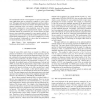Free Online Productivity Tools
i2Speak
i2Symbol
i2OCR
iTex2Img
iWeb2Print
iWeb2Shot
i2Type
iPdf2Split
iPdf2Merge
i2Bopomofo
i2Arabic
i2Style
i2Image
i2PDF
iLatex2Rtf
Sci2ools
ICASSP
2011
IEEE
2011
IEEE
Pitch transposition and breathiness modification using a glottal source model and its adapted vocal-tract filter
The transformation of the voiced segments of a speech recording has many applications such as expressivity synthesis or voice conversion. This paper addresses the pitch transposition and the modification of breathiness by means of an analytic description of the deterministic component of the voice source, a glottal model. Whereas this model is dedicated to voice production, most of the current methods can be applied to any pseudo-periodic signals. Using the described method, the synthesized voice is thus expected to better preserve some naturalness compared to a more generic method. Using preference tests, it is shown that this method is preferred for important pitch transposition (e.g. one octave) compared to two state of the art methods. Additionally, it is shown that the breathiness of two male utterances can be controlled.
ICASSP 2011 | Important Pitch Transposition | Pitch Transposition | Signal Processing | Voiced Segments |
| Added | 20 Aug 2011 |
| Updated | 20 Aug 2011 |
| Type | Journal |
| Year | 2011 |
| Where | ICASSP |
| Authors | Gilles Degottex, Axel Röbel, Xavier Rodet |
Comments (0)

